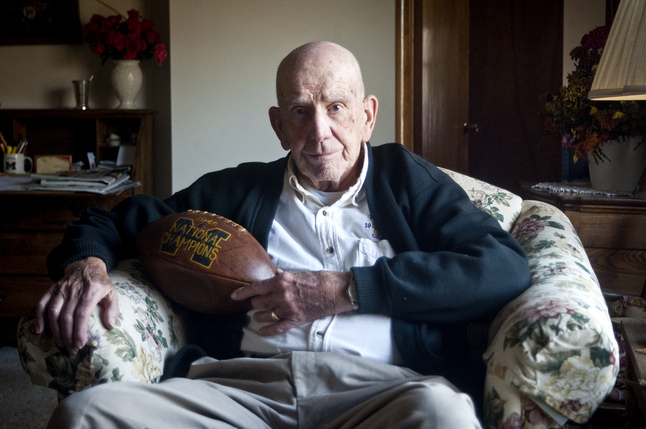Herb Frederick has mended and tended Wolverine sports equipment since 1942

Herb Fredrick has been working with Michigan Athletics since 1943. His jobs have ranged from transporting equipment for games to polishing helmets, which he still does before every game.
Joseph Tobianski | AnnArbor.com
On Saturdays before a home game, Herb and his sons, Jeffrey and Matthew, along with four or five students, spend one and a half to two hours in the morning cleaning and waxing them. For away games, they do it Thursday afternoon so the helmets are ready when the team travels on Friday.
That’s why they look shiny and new on TV or at the game.
With artificial turf in so many stadiums now, the helmets don’t get the dirt and grass stains like they do in South Bend or East Lansing, but they still get scuffed and scraped, and they pick up paint from the opposing team’s helmets. Herb’s favorite way of cleaning is with a Brillo pad and water.
Herb began working for the university in the winter of 1942 when he got a job at the Sports Coliseum at Hill and Fifth Avenue, sharpening skates and cleaning the ice. They didn’t have Zambonis back then, so they cleaned the ice with shovels and brooms.
In the spring, a job helping with football practice opened up, and Herb took it - a good high school job. That began his association with Michigan football, which has lasted to this day. After a stint in the Army and receiving his accounting degree from Cleary College, Herb worked with Argus Camera Co. then Bendix Corp., but continued working part-time in the equipment room.
He says that the biggest change over the years has been the increase in the amount of equipment. “Irv Arnold and I used to load everything in a rental truck and drive to Evanston or Bloomington, or wherever,” he said. “Now they take a huge semi. And Henry Hatch (equipment manager from 1921 to 1964) was the only equipment person to travel to the 1948 Rose Bowl; he hired one person in California to help him out. That wouldn’t be near enough these days.
“The kids have three or four pairs of shoes in their locker, not just one. And this year, for the first time, they have a practice helmet as well as a game helmet.”
Of course, another change he's seen is the switch from leather helmets to plastic. According to Herb, the leather helmets weren’t as unsafe as you might think. “They were solid, thick, and heavy, and didn’t crack,” he said. “They needed to be cleaned, too, of grass and dirt, and finished with a liquid wax. The newer helmets are better overall, but they are lighter and do crack occasionally, especially in colder weather, near where the holes are drilled to attach the face mask.”
Herb has worked on more than helmets in the equipment room. Sewing, patching, repairing, fixing uniforms in any way possible was once more common because of budget restrictions. “We had three Singer sewing machines,” he said. “One was a zigzag, mainly for sewing numbers on the jerseys. We had a darner used to repair most things, and a leather machine to sew ripped shoes. I’m probably the last person to sew a pair of shoes here.” He remembers Bob Chappius (1942, ’46, ’47) getting mad because his pants that had been sewn so many times were finally thrown away. He made them go get them and patch them up.
“Henry Hatch was a fabulous guy and a fabulous equipment manager for saving money,” Herb said. “He figured out a way to make hip guards or other protective devices rather than buying something new. He is also the one who worked with equipment manufacturers to come up with the 1940s version of the ‘tear-away’ jersey that became popular in the ’70s. Tacklers used to grab Tom Harmon’s jersey and hold on until they could drag him down. Henry came up with the idea of making a jersey that would tear away if it was grabbed. They would have a piece of Harmon’s jersey in their hand, but he would have the ball in the end zone.”
Traveling to away games was usually uneventful, except when the truck broke down, which Herb said happened to him three times. And since the inception of the Athletic Equipment Managers Association in 1973, schools’ equipment people have treated each other with more respect, according to Herb. Jon Falk, UM’s current equipment manager, was one of the original members and served as executive director from 1987 to 2010.
There has been one exception. “You don’t want to go to Columbus,” Herb said. “They had students living in Ohio Stadium, and they would pour water, sometimes urine, down on us when we backed the truck to unload it.”
Herb Frederick represents what Michigan football has been and is to hundreds, thousands like him. It’s part of the culture, part of their life, and they enjoy and contribute to it. As Herb says, “It gets in your blood. It’s passed on to your children. I’m not doing it for the money. It’s fun. If you do it, you have to like it.”
Stories like his are countless. You probably all know some.
Bob Horning, a lifelong Ann Arbor resident, is writing U-M gameday stories for AnnArbor.com. If you have ideas for future columns, please email news@annarbor.com.


Comments
Scott
Sat, Nov 10, 2012 : 2:58 p.m.
Incredible article. What history. The same fellow cleaning equipment since BEFORE WWII.